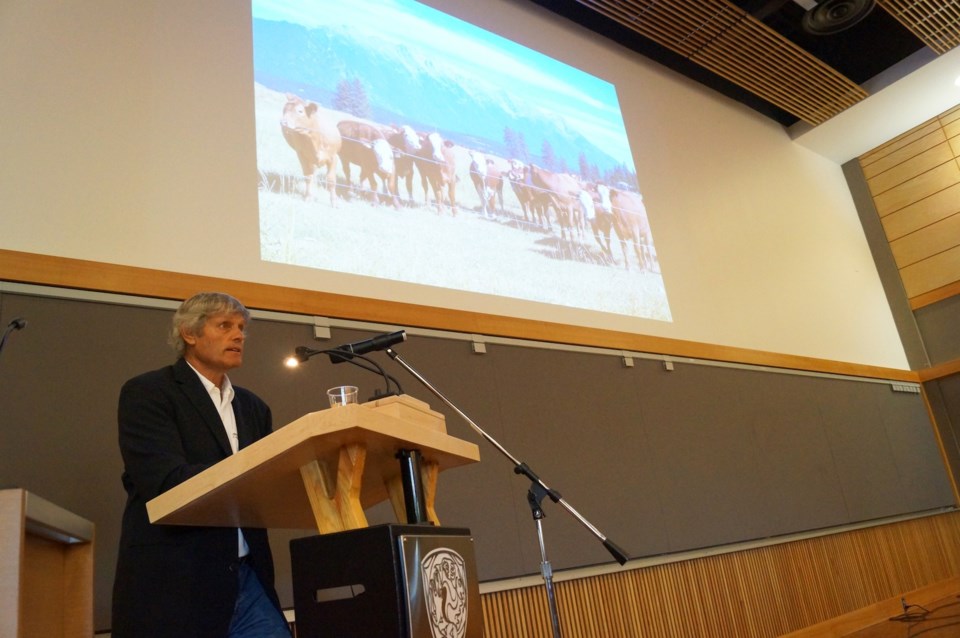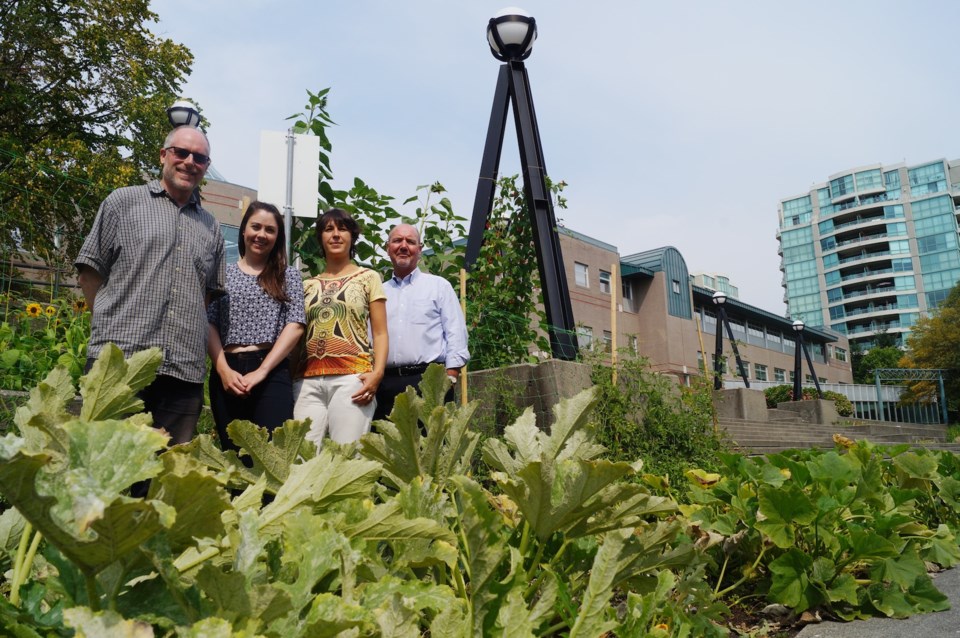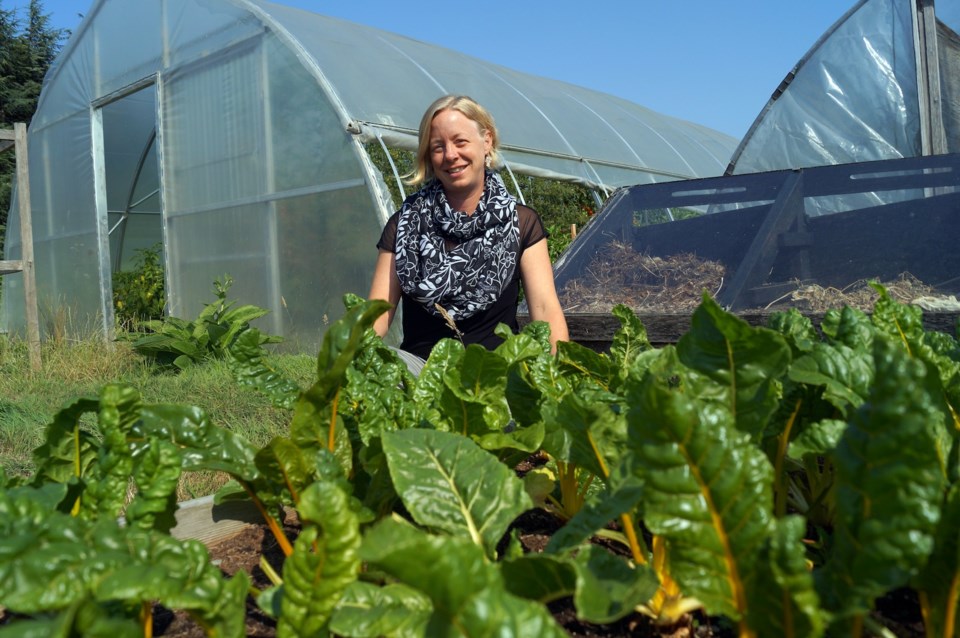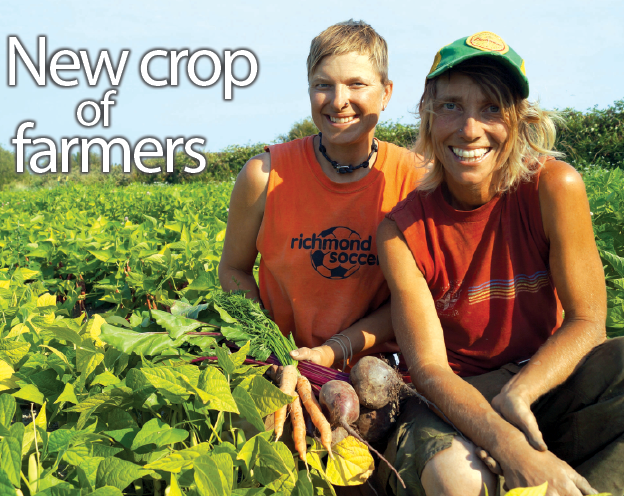Every Saturday this summer, Kareno Hawbolt and Kimi Hendess have set up a small stand for their produce company, Sweet Digz, outside the Nirvana food mart at the south end of No. 2 Road.
There, they sell the organic produce harvested, largely by hand, from a four-acre plot up the road, behind a new mansion owned by their landlord.
Slightly further up the road, a 6.2-acre plot in the provincial Agricultural Land Reserve is for sale, listed for $8.2 million. Half of the property is designated for residential or business use.
The sale would work out to about $1.3 million per acre, a rate that effectively prices out anyone such as Hawbolt or Hendess from owning the land they farm.
Instead, the two are forced to lease at the going rate of roughly $250 per acre, per month.
While Dr. Kent Mullinix, director of the Kwantlen Polytechnic University Institute for Sustainable Food Systems, may be remiss to call the two upstart organic farmers serfs (and he did not), he is very blunt about what is going on in Richmond, Metro Vancouver and other parts of the province.
“That economic system is called feudalism,” he said.
“The issue is the farmers can’t buy land; they can’t afford it. There’s no agriculture start-up that can service $50,000 an acre cost, let alone $300,000 (the average cost of ALR land in Richmond),” said Mullinix, noting “you can’t grow enough broccoli” to service such debt.
Without a plan to make farming more accessible in the midst of irrefutable scientific evidence of climate change and pollution, the existence of healthy, sustainable and cost-efficient food is in jeopardy, experts argue.
Farms continue to be threatened

Mullinix recently hosted a public forum with recently fired Agricultural Land Commission chair Richard Bullock as the guest speaker. Bullock also described the situation bluntly.
“We’ve got to take the speculative value out of farmland, and my concern is we we're moving down that road, but some recent changes may have given hope to speculators again,” said Bullock.
Those changes are recent reforms to the Agricultural Land Commission, the provincial authority that manages the ALR. A loosening of some rules is allowing more business-related infrastructure on ALR land, noted Coun. Harold Steves, who has repeatedly claimed much of Richmond’s farmland is being bought by foreign investors — although no one has yet proven that.
“The (buyers) don’t even know it’s farmland and that they can’t develop it,” said Steves, who has told city council how some in the real estate sector are marketing farmland for future development.
Some of that development is already happening, however, with the building of mansions along the street front.
Not only do the houses ruin the land for farming in perpetuity (or at least the 100 years or so required to build the soil back up), they also alter the public’s perception of farming in the community, said Hendess.
“The houses block out views and the public loses the understanding that there’s farming going on and there’s something to protect. And so, when they can see farming they’re more connected to it, I think,” she said.
According to Metro Vancouver research from 2011, roughly 25 per cent of the ALR in the region is not being farmed. Another quarter is unusable (parks, golf courses, roads) and the half that is farmed accounts for 27 per cent of B.C.’s farm receipts.
“You’re on top of some of the finest agriculture today in the province,” said Bullock.
KPU researching land value

Mullinix intends to bring clarity to what has driven up ALR land value and who owns the land.
A research project this fall has been made possible by a federal grant funded by the Social Science and Humanities Research Council with the City of Richmond and the City of Surrey as partners, given both cities have urban development fronting ALR land.
“We will also calculate what people would have to pay for commonly produced and consumed foods from farmers in Richmond and Surrey if consumers paid for these foods at a rate that would allow farmers to purchase ALR land and service the debt,” added Mullinix.
In the spring of 2016, KPU in Richmond will graduate its first cohort of students in the Bachelors of Applied Science in sustainable agriculture program.
The program is focused on studying food systems and their impacts on both local and global food security. Graduates may become anything from farmers, teachers, resource managers, and government and non-profit employees.
Among the students are Grace Augustinowicz and Rebecca Kilford, who tentatively plan to become an educator and policy planner, respectively.
“I want to change our food system and create a more equal balance because the scale is so out of whack from the farmers to production,” said Kilford.
Food (in)security
Experts in the field note that there are a number of reasons why it’s important to maintain local agricultural land, from health and environmental benefits to global and national security.
“Our potential to have an impact on the environment with the way we eat is tremendous,” said KPU instructor Dr. Michael Bomford, who said as much as 15 per cent of energy consumption is related to the way we eat.
And while much attention has been put on “food miles” in one’s diet, Bomford adds that “we need to look at the whole system and that includes the processing and packaging of food and how we prepare food in our kitchens.”
Bomford has also studied the food system’s impact on climate change, noting livestock contributes to greenhouse gases (14.5 per cent of all human-caused GHGs, according to the United Nations in 2013).
Those gases are warming the world, causing climate change.
Whether one believes that such gases are causing California’s repeated droughts, Steves said the state’s water problems are reason enough to keep and ameliorate farmland in B.C. granted roughly 65-70 per cent of the fruits and vegetables British Columbians eat come from there.
State statistics show declining reservoirs and aquifers over the past decade.
“Major producing areas are suffering from drought. They’re also suffering from elevated temperatures. The fact is both factors will render these major production areas unable to produce in the future,” warned Mullinix.
Food prices rising three times faster than all other costs
Statistics Canada shows overall food prices rising faster than the Consumer Price Index: From June 2014 to June 2015, CPI was 1.0 while food rose by 3.4 per cent (fresh meat, a water-intensive product, rose 12.7 per cent).
“We can continue to pay more and more and more for scarce goods or we can develop the capacity here to grow it,” said Mullinix.
This month, another project aims to tackle local food security and examine the gaps in Richmond’s local food system.

The Richmond Food Security Society is hosting the Richmond Eats challenge (Raiseathon.ca/RichmondEats) whereby participants may only eat food grown or raised on Lulu Island from Aug. 24 to 30.
It’s the first major public event for the society’s new director Anita Georgy.
“It’s about raising awareness for local farmers and for us, in the community, to connect with local food and to get in touch with the seasonality of food, and discover gaps in the food system.
And it will be an opportunity to look at issues of food security, such as what are the prices of things in Richmond and what is available organically,” she said.
The challenge allows for participants to have three “cheat” items, such as cooking oil, bread or tofu.
A list of local farms will help people source their food.
Getting more boots on the ground
Finding enough farmers such as Hawbolt and Hendess may not be an issue for the handful of participants in the challenge but it could be for the community at large, according to long-time farmer Bill Zylmans.
“We’re not seeing the outsiders coming in. And a lot of farmer sons and daughters are leaving the farms because they want an easier lifestyle,” he said, noting medium-sized farms are replacing the smaller operations over time.
Zylmans said the regular stresses of farming have been compounded by the fact it’s only realistic to lease land in the Lower Mainland.
At the Sweet Digz farm, Hendess said they were lucky to get a five-year lease as most owners will not lease for more than one year, if at all, making small operations difficult to hold on to.
Mullinix said owners like leasing land because of the tax breaks but Hawbolt said on smaller lots the breaks are a “drop in the bucket” compared to not having to deal with a lease.
There are things that can be done to prevent land speculation, said Mullinix. For instance, many provinces in Canada place restrictions on foreign investment in farmland, as does China and a number of European countries.
With China feeding one billion people, Bullock notes, “no place else in the world treats their land like we do.”
On a smaller scale, Hawbolt notes the city could set special agricultural water rates to assist local operations.
Sweet Digz participates in a community-supported agriculture program whereby people can pay for produce in the spring, to help local farmers start their crops. A payment of $480 up front gets you $30 of organic produce from Sweet Digz for 16 straight weeks throughout the summer and fall. Hawbolt said such programs need continued support.
As well, programs such as KPU’s “farm incubator” lends students half-acre plots as testing grounds.
The now retired Bullock concluded, “This is something we need three times a day. We gotta eat and the closer we get the food, the better.”



